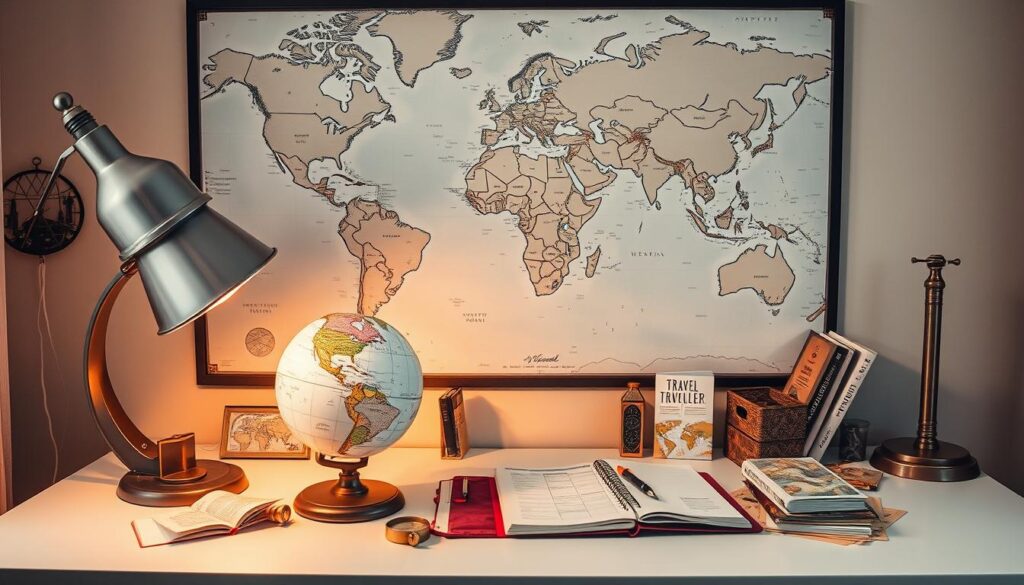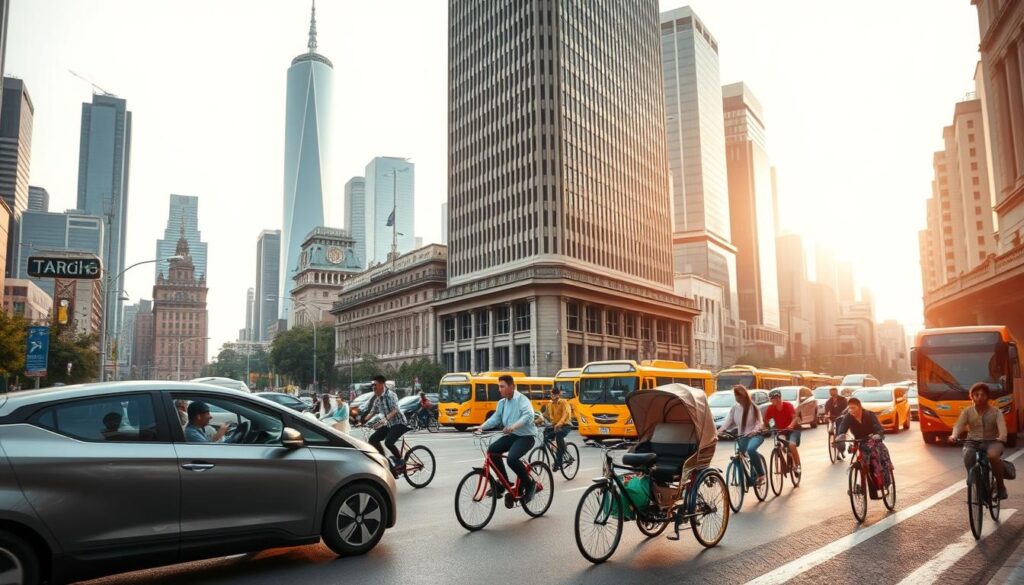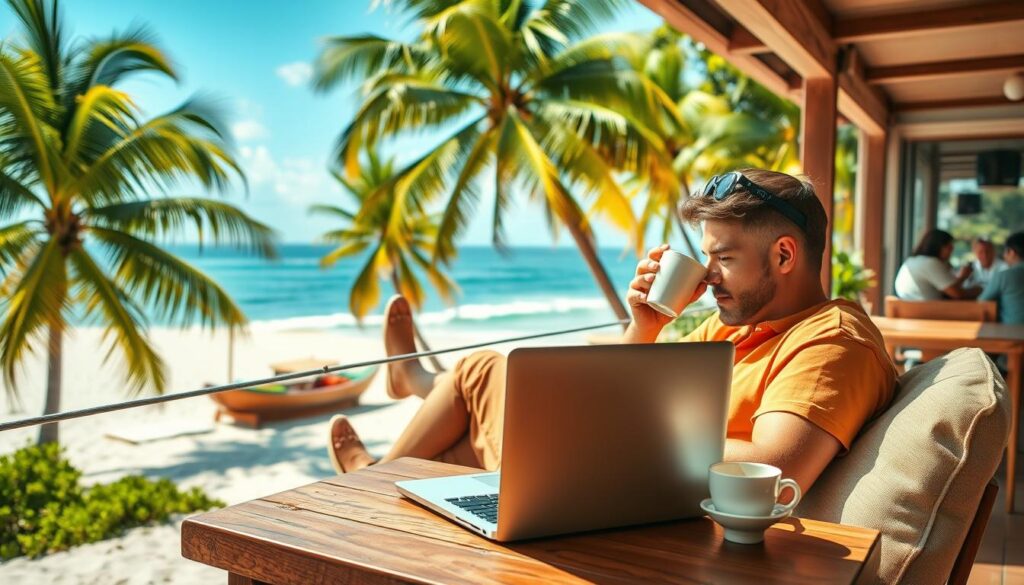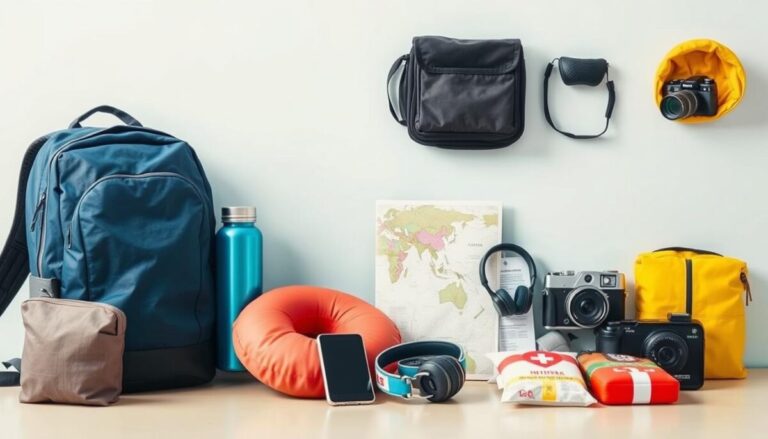
Welcome to your ultimate destination for travel planning and exploration. Here, you’ll discover comprehensive travel guides and expert tips to make your next adventure seamless and enjoyable.
Whether you’re a seasoned traveler or just starting to plan your first trip, our resources are designed to help you explore the world with ease and excitement. From budget-friendly travel tips to in-depth guides on destinations around the globe, we’ve got you covered.
Key Takeaways
- Comprehensive travel guides for various destinations
- Expert tips on travel planning
- Budget-friendly travel advice
- Resources for both seasoned travelers and beginners
- Insights into making your travel experience enjoyable and stress-free
The Ultimate Guide to Travel Planning
Effective travel planning is the backbone of a memorable and stress-free trip. It involves several crucial steps that help you make the most out of your journey.
When to Start Planning Your Trip
One of the most critical aspects of travel planning is timing. Generally, the earlier you start planning, the better. This allows you to research destinations thoroughly and make informed decisions about your trip.
According to travel experts, starting your planning process at least 6 months in advance is ideal. This timeframe gives you ample opportunity to:
- Research potential destinations
- Compare prices for flights and accommodations
- Create a realistic budget
Setting Realistic Travel Goals and Expectations
Setting realistic goals is essential to enjoying your trip. This involves understanding your limitations, budget constraints, and personal preferences.
As travel blogger, Michelle Baran, once said,
“The key to a successful trip is not just about seeing the sights, but also about immersing yourself in the local culture.”
Creating a Travel Bucket List
Creating a travel bucket list is a fun and engaging way to start planning your trip. It involves identifying places you want to visit and experiences you want to have.
| Destination | Must-See Attractions | Best Time to Visit |
|---|---|---|
| Paris, France | Eiffel Tower, Louvre Museum | Spring (April-May) |
| Tokyo, Japan | Shibuya Crossing, Meiji Shrine | Autumn (September-October) |
| New York City, USA | Statue of Liberty, Central Park | Anytime, but avoid peak season |
By following these steps and conducting thorough destination research, you can create a travel plan that meets your expectations and provides lifelong memories.
All Travel Content Resources You Need
Whether you’re a seasoned traveler or just starting out, having access to the right travel resources can make all the difference. With the vast array of information available, you can plan your trip with confidence and make informed decisions.
Online Travel Platforms and Communities
Online travel platforms and communities are invaluable resources for travelers. Websites like TripAdvisor and Lonely Planet offer a wealth of information on destinations around the world. These platforms allow you to read reviews, book accommodations, and plan activities with ease. Joining online travel communities on social media or forums can also provide insights and tips from fellow travelers.
Travel Blogs, Books, and Magazines
Travel blogs, books, and magazines are great sources of inspiration and information. Blogs like The Blonde Abroad and Expert Vagabond offer personal anecdotes and practical advice on traveling. Travel books and guidebooks provide in-depth information on destinations, cultures, and activities. Magazines such as Travel + Leisure and National Geographic Traveler feature stunning photography and articles on travel trends and tips.
Travel Podcasts and Video Channels
For those who prefer auditory or visual content, travel podcasts and video channels are excellent resources. Podcasts like “The Travel Show” and “Zero to Travel” offer engaging stories and practical advice. YouTube channels such as Mark Wiens and Lost LeBlanc feature culinary and adventure travel content that can inspire your next trip.
By leveraging these resources, you can enhance your travel experience and create unforgettable memories. Whether you’re looking for travel tips, cultural experiences, or adventure travel ideas, there’s something out there for everyone.
Destination Research: Finding Your Perfect Spot
With countless options available, destination research is key to a successful travel experience. Whether you’re a seasoned traveler or planning your first trip, finding the right destination can make all the difference.
Popular Destinations for American Travelers
Many American travelers flock to well-known destinations such as Orlando, Florida, for its theme parks, and New York City, for its iconic landmarks. Other popular spots include:
- Las Vegas, Nevada, for its vibrant nightlife and entertainment options
- San Francisco, California, with its Golden Gate Bridge and diverse cultural scene
- Yellowstone National Park, for its breathtaking natural beauty
These destinations offer a mix of culture, adventure, and relaxation that appeals to a wide range of travelers.
Emerging Destinations Worth Considering
For those looking to venture off the beaten path, emerging destinations offer unique experiences. Some of these include:
- Asheville, North Carolina, known for its arts scene and outdoor activities
- Portland, Oregon, famous for its food trucks and coffee culture
- Big Sur, California, with its stunning coastal scenery
Seasonal Travel Recommendations
The best time to visit a destination can greatly impact your travel experience. For example:
| Destination | Best Time to Visit | Highlights |
|---|---|---|
| Hawaii | September to November | Mild weather, fewer crowds |
| New Orleans | February to May | Mardi Gras celebrations, jazz festivals |
Understanding the seasonal nuances of your chosen destination can help you plan a more enjoyable trip.
By considering both popular and emerging destinations, as well as the best times to visit, you can tailor your travel plans to suit your preferences and make the most of your trip.
Budget-Friendly Travel Strategies
Budget-friendly travel is all about smart planning and savvy deals. Whether you’re a seasoned traveler or just starting to explore the world, there are numerous ways to save money without compromising on experiences.
Finding Flight Deals and Accommodation Bargains
One of the most significant expenses in travel is flights. To save on this, consider being flexible with your travel dates and using flight comparison websites like Google Flights or Skyscanner to find the best deals. Additionally, signing up for airline newsletters and following them on social media can alert you to sales and promotions.
For accommodation, instead of opting for expensive hotels, look into budget-friendly alternatives like hostels or vacation rentals through platforms like Airbnb. Booking in advance and staying outside the city center can also lead to significant savings.
Saving Money on Activities and Dining
When it comes to activities, research is key. Look for free walking tours, public museums, or local events that are often free or low-cost. For dining, instead of eating at touristy restaurants, venture into local neighborhoods to find authentic and affordable eateries. Street food is another great option for delicious meals at a fraction of the cost.
Travel Rewards Programs Worth Joining
Travel rewards programs can be a great way to earn points or miles that can be redeemed for flights, accommodations, or other travel expenses. Programs like Chase Sapphire Preferred or Capital One Venture offer generous sign-up bonuses and rewards structures that can significantly offset travel costs. It’s worth researching and comparing different programs to find one that aligns with your travel habits.
By employing these budget-friendly travel strategies, you can enjoy your travels without breaking the bank. Whether it’s finding cheap flights, affordable accommodations, or saving on activities, every little bit counts towards making your travel dreams more affordable.
Tailoring Travel to Your Personal Style
Whether you’re flying solo, vacationing with family, or embarking on an adventure, personalizing your travel plans is key to a fulfilling experience. Travel is a personal journey, and what works for one person may not work for another.
Solo Travel Planning and Resources
Solo travel can be incredibly liberating. To make the most of it, consider resources like solo travel communities and apps designed to connect solo travelers. Websites like Solo Traveler and Lonely Planet offer valuable tips and itineraries tailored for solo adventurers.
Family Vacation Essentials
When planning a family vacation, it’s essential to consider the interests and age ranges of all family members. Look for destinations that offer a variety of activities. Theme parks, national parks, and kid-friendly resorts are great options. Planning ahead and booking activities that cater to your family’s preferences can make for a memorable trip.
Adventure and Specialty Travel
For those seeking adventure, there are numerous specialty travel options available, from hiking and biking tours to culinary and cultural experiences. Researching and choosing operators that specialize in your desired adventure can ensure a high-quality experience.
| Travel Type | Key Considerations | Recommended Resources |
|---|---|---|
| Solo Travel | Safety, Community, Flexibility | Solo Traveler, Lonely Planet |
| Family Vacation | Age-appropriate activities, Accommodation | Family Travel Forum, Kid & Coe |
| Adventure Travel | Activity level, Guides, Safety | Adventure Travel Trade Association, REI |
By tailoring your travel plans to fit your personal style, you can create a journey that’s both memorable and meaningful.
Transportation Essentials Around the World
As you prepare for your next adventure, it’s essential to consider the various transportation options available to you. Understanding how to navigate international flights and airports, as well as local transportation once you arrive, can greatly enhance your travel experience.
Navigating International Flights and Airports
When traveling internationally, flight planning is crucial. Researching and booking flights in advance can help you secure better deals. Upon arrival, navigating airport procedures, such as customs and baggage claim, can be streamlined by being prepared and knowing what to expect.
- Check-in online and print or download your boarding pass
- Research airport layouts and familiarize yourself with terminal locations
- Understand customs and immigration requirements
Local Transportation Options Abroad
Once you arrive at your destination, understanding local transportation options is vital. This can include rental cars, public transportation, and alternative modes of transport.
Rental Cars, Trains, and Alternative Transport
For flexibility, consider renting a car, especially in areas with limited public transportation. Trains are another convenient option, offering a scenic way to see the countryside. Alternative transport, such as bike rentals or walking tours, can provide a more immersive cultural experience.

By understanding your transportation options and planning accordingly, you can focus on enjoying your travel experience. Whether you’re looking for convenience, cultural immersion, or adventure, there’s a transportation solution to fit your needs.
Immersive Cultural Experiences
The essence of travel lies in embracing the local way of life and cultural practices. When you immerse yourself in the culture of a place, you gain a deeper understanding and appreciation of its history, customs, and people.
Connecting with Local Communities
One of the best ways to experience a culture is by connecting with its people. This can be achieved by staying in locally-owned accommodations, participating in community-based tourism projects, or simply engaging with locals you meet during your travels.
Community-based tourism initiatives allow you to contribute directly to the local economy and gain insights into the daily lives of the community members. You can also learn about local customs and traditions by attending cultural events or workshops.
Food Tourism and Culinary Adventures
Food is a universal language that can bridge cultural gaps and create lasting memories. Food tourism involves exploring the local cuisine, from street food to high-end restaurants, and learning about the culinary traditions behind the dishes.
Culinary adventures can range from cooking classes to food tours, where you can sample local ingredients and dishes. These experiences not only tantalize your taste buds but also provide a deeper understanding of the culture.
Cultural Etiquette and Language Resources
Understanding cultural etiquette is crucial when interacting with locals. Simple gestures, such as using the local greeting or respecting dress codes, can go a long way in making a positive impression.
Having the right language resources can also enhance your cultural experience. This includes carrying a phrasebook, using translation apps, or taking a basic language course before your trip.
- Learn basic phrases like “hello,” “thank you,” and “excuse me.”
- Understand local customs and dress codes.
- Use translation apps to communicate effectively.
By embracing these practices, you can have a more immersive and respectful cultural experience during your travels.
Digital Nomad Lifestyle and Travel Tech
As remote work becomes the norm, the digital nomad lifestyle is gaining popularity, transforming travel experiences. This shift is largely driven by advancements in travel tech, enabling individuals to work from anywhere in the world.
Essential Travel Apps and Gadgets
For digital nomads, having the right travel apps and gadgets is crucial. Apps like Google Translate and TripIt can simplify travel planning and navigation. Gadgets such as portable Wi-Fi hotspots and power banks ensure that you stay connected and powered up on the go.
Some other essential tools include noise-canceling headphones for productivity and travel adapters for convenient charging. With these tools, digital nomads can maintain a healthy work-life balance while exploring new destinations.

Working Remotely While Traveling
Working remotely while traveling requires discipline and the right infrastructure. It’s essential to find reliable Wi-Fi and create a conducive workspace, whether it’s a coffee shop or a co-working space. Time zone differences can also be a challenge, so it’s crucial to manage your schedule effectively.
Staying Connected Internationally
Staying connected internationally is vital for digital nomads. This involves choosing the right international data plans or using VPNs to access geo-restricted content. Staying in touch with family and friends back home through video calls can also help maintain a sense of community while abroad.
By leveraging the right travel tech and maintaining a flexible mindset, digital nomads can enjoy a fulfilling lifestyle that combines work and adventure travel.
Travel Health, Safety, and Insurance
As you prepare for your next adventure, don’t overlook the importance of travel health and safety measures. Ensuring you’re well-prepared can make a significant difference in your travel experience.
Pre-Trip Medical Preparations
Before embarking on your journey, it’s essential to consult with your healthcare provider, especially if you have pre-existing medical conditions. Make sure your vaccinations are up to date, and discuss any necessary medications or precautions for your destination.
Researching your destination’s health concerns is also crucial. For instance, some countries require specific vaccinations or have prevalent diseases that you should be aware of. Stay informed about local health advisories to minimize risks.
Safety Resources and Emergency Planning
Understanding local safety conditions can help you avoid potential dangers. Register with your government’s travel advisory service to receive timely updates on safety and security conditions in your destination.
Having an emergency plan is vital. Know the local emergency numbers and have a plan for contacting family or embassy officials if needed. Keeping digital and physical copies of important documents (like your passport and ID) can also be lifesaving.
Choosing the Right Travel Insurance
Travel insurance is a critical component of travel planning. It can cover unexpected medical expenses, trip cancellations, and lost luggage. When selecting a policy, consider the types of activities you’ll be doing and ensure you’re covered for any high-risk activities.
| Insurance Type | Coverage | Cost |
|---|---|---|
| Basic | Medical emergencies, trip cancellations | $50-$100 |
| Premium | Includes basic coverage plus adventure activities, travel delays | $100-$250 |
| Annual Multi-Trip | Covers multiple trips within a year | $200-$500 |
By taking these steps, you can ensure a safer, healthier, and more enjoyable travel experience. Remember, preparation is key to a successful trip.
Conclusion: Embarking on Your Next Adventure
As we conclude our comprehensive guide to all travel content, you’re now equipped to start planning your next trip. Whether you’re revisiting a favorite destination or exploring new horizons, remember that travel is about the journey, not just the destination.
Consider your travel recommendations carefully, and don’t be afraid to venture off the beaten path. Adventure travel can be a life-changing experience, allowing you to connect with local communities and immerse yourself in new cultures.
With the right mindset and preparation, you’ll be ready to embark on a journey that will leave you with unforgettable memories. So pack your bags, grab your camera, and get ready to explore the world.
FAQ
What are the best resources for planning a trip?
How do I choose the right destination for my next trip?
What are some budget-friendly travel strategies?
How can I tailor my travel plans to fit my personal style?
What are some essential travel apps and gadgets?
How can I stay safe and healthy while traveling?
What should I consider when choosing travel insurance?
How can I immerse myself in local cultures while traveling?
Share :
You Might Also Like







